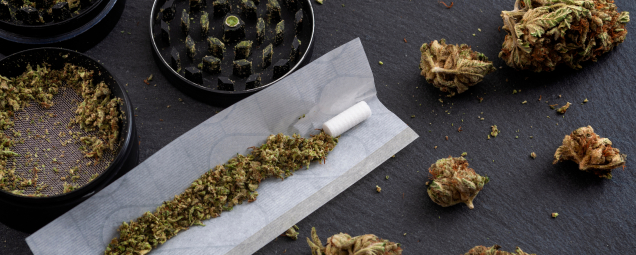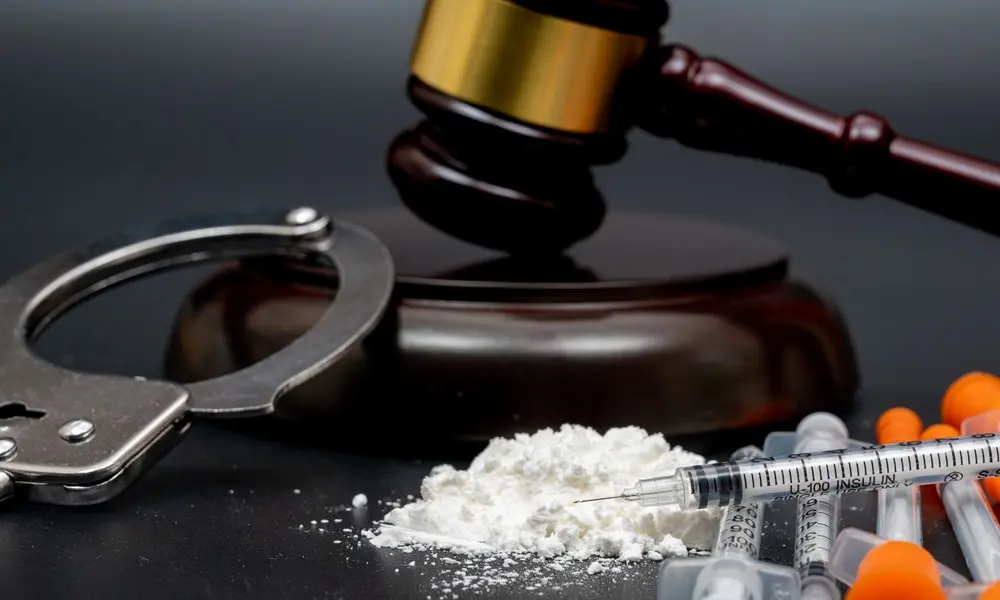| Offense |
Penalty |
| Possession of Marijuana |
| Up to 99 grams |
Minor misdemeanor, max $150 fine. |
| 100–199 grams |
Fourth-degree misdemeanor, 30 days in jail, $250 fine. |
| 200–999 grams |
Fifth-degree felony, one year in jail, $2,500 fine. |
| 1,000–19,999 grams |
Third-degree felony, 5 years in prison, $10,000 fine. |
| 20,000 or more grams |
Second-degree felony, 8 years in prison, $15,000 fine. |
| Possession of Cocaine |
|
| Up to 4 grams |
Fifth-degree felony, 12 months in jail, $2,500 fine. |
| 5–9 grams |
Fourth-degree felony, 18 months in prison, $5,000 fine. |
| 10–19 grams |
Third-degree felony, 3 years in prison, $10,000 fine. |
| 20–26 grams |
Second-degree felony, 8 years in prison, $15,000 fine. |
| 27 grams or more |
First-degree felony, 11 years in prison, $20,000 fine. |
| Possession of Heroin |
|
| Up to 9 unit doses (under 1 gram) |
Fifth-degree felony, 12 months in jail, $2,500 fine. |
| 10–49 doses (1–4 grams) |
Fourth-degree felony, 18 months in prison, $5,000 fine. |
| 50–99 doses (5–9 grams) |
Third-degree felony, 3 years in prison, $10,000 fine. |
| 100–499 doses (10–49 grams) |
Second-degree felony, 8 years in prison, $15,000 fine. |
| 500 doses or more (50 grams or more) |
First-degree felony, 11 years in prison, $20,000 fine. |
| Possession of LSD |
|
| Up to 9 unit doses (under 1 gram of liquid LSD). |
Fifth-degree felony, 1 year in jail, $2,500 fine. |
| 10–49 unit doses (1–4 grams of liquid LSD). |
Fourth-degree felony, 18 months in prison, $5,000 fine. |
| 50–249 unit doses (5–24 grams of liquid LSD). |
Third-degree felony, 5 years in prison, $10,000 fine. |
| 250–999 unit doses (25–99 grams of liquid LSD). |
Second-degree felony, 8 years in prison, $15,000 fine. |
| 1,000 doses or more (100 grams or more of liquid LSD). |
First-degree felony, 11 years in prison, $20,000 fine. |
| Possession of Schedule I, II Substances |
|
| Lesser than bulk amount (excluding specified drugs). |
Fifth-degree felony, 1 year in prison, $2,500 fine. |
| Bulk amount to less than 5 times bulk amount. |
Third-degree felony, 5 years in prison, $10,000 fine. |
| 5 times bulk amount to less than 50 times bulk amount. |
Second-degree felony, 8 years in prison, $15,000 fine. |
| 50 times bulk amount. |
First-degree felony, 11 years in prison, $20,000 fine. |
| Possession of Schedule III, IV, V Substances |
|
| Lesser than bulk amount. |
First-degree misdemeanor, 6 months in jail, $1,000 fine. |
| Bulk amount to less than 5 times bulk amount. |
Fourth-degree felony, 18 months in prison, $5,000 fine. |
| 5 times bulk amount to less than 50 times bulk amount. |
Third-degree felony, 5 years in prison, $10,000 fine. |
| 50 times bulk amount. |
Second-degree felony, 8 years in prison, $15,000 fine. |
| Trafficking in Marijuana |
|
| Up to 199 grams |
Fifth-degree felony, 1 year in jail, $2,500 fine. |
| 200–999 grams |
Fourth-degree felony, 18 months in prison, $5,000 fine. |
| 1,000–19,999 grams |
Third-degree felony, 5 years in prison, $10,000 fine. |
| 20,000 grams or more |
Second-degree felony, 8 years in prison, $15,000 fine. |
| Trafficking in Cocaine |
|
| Up to 4 grams |
Fifth-degree felony, 1 year in jail, $2,500 fine. |
| 5–9 grams |
Fourth-degree felony, 18 months in prison, $5,000 fine. |
| 10–19 grams |
Third-degree felony, 5 years in prison, $10,000 fine. |
| 20–26 grams |
Second-degree felony, 8 years in prison, $15,000 fine. |
| 27 grams or more |
First-degree felony, 11 years in prison, $20,000 fine. |
| Trafficking in Heroin |
|
| Up to 9 unit doses (under 1 gram) |
Fifth-degree felony, 1 year in jail, $2,500 fine. |
| 10–49 doses (1–4 grams) |
Fourth-degree felony, 18 months in prison, $5,000 fine. |
| 50–99 doses (5–9 grams) |
Third-degree felony, 5 years in prison, $10,000 fine. |
| 100–499 doses (10–49 grams) |
Second-degree felony, 8 years in prison, $15,000 fine. |
| 500 doses or more (50 grams or more) |
First-degree felony, 11 years in prison, $20,000 fine. |
| Trafficking in LSD |
|
| Up to 9 unit doses (under 1 gram of liquid LSD). |
Fifth-degree felony, 1 year in jail, $2,500 fine. |
| 10–49 unit doses (1–4 grams of liquid LSD). |
Fourth-degree felony, 18 months in prison, $5,000 fine. |
| 50–249 unit doses (5–24 grams of liquid LSD). |
Third-degree felony, 5 years in prison, $10,000 fine. |
| 250–999 unit doses (25–99 grams of liquid LSD). |
Second-degree felony, 8 years in prison, $15,000 fine. |
| 1,000 doses or more (100 or more grams of liquid LSD). |
First-degree felony, 11 years in prison, $20,000 fine. |
| Trafficking in Fentanyl |
|
| Up to 9 unit doses (under 1 gram) |
Fifth-degree felony, 1 year in jail, $2,500 fine. |
| 10–49 unit doses (1–4 grams) |
Fourth-degree felony, 18 months in prison, $5,000 fine. |
| 50–99 unit doses (5–9 grams) |
Third-degree felony, 5 years in prison, $10,000 fine. |
| 100–199 unit doses (10–19 grams) |
Second-degree felony, 8 years in prison, $15,000 fine. |
| 200 or more unit doses (20 or more grams) |
First-degree felony, 11 years in prison, $20,000 fine. |
| Trafficking in Schedule I or II Drugs |
|
| Lesser than bulk amount |
Fourth-degree felony, 18 months in prison, $5,000 fine. |
| Bulk amount to less than 5 times bulk amount |
Third-degree felony, 5 years in prison, $10,000 fine. |
| 5 times bulk amount to less than 50 times bulk amount |
Second-degree felony, 8 years in prison, $15,000 fine. |
| 50 times bulk amount |
First-degree felony, 11 years in prison, $20,000 fine. |


























